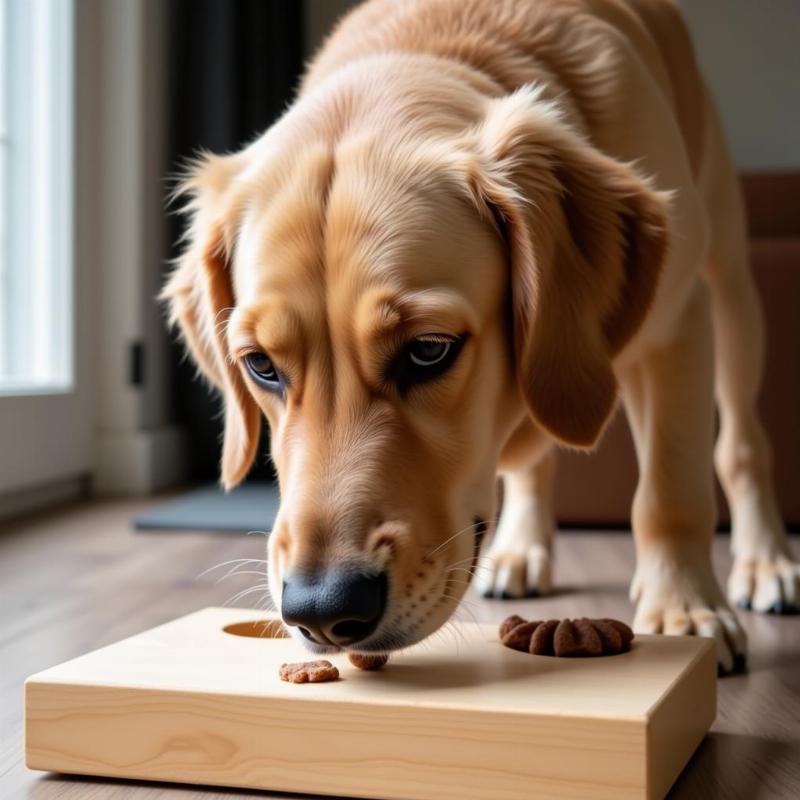Destructive behavior in dogs, sometimes described as “destroying as a dog might” in crossword puzzles, can be a frustrating experience for owners. Understanding the root causes of this behavior is key to addressing it effectively and creating a harmonious home for both you and your furry friend. This article delves into the reasons behind canine destruction, offering practical solutions and insights tailored for dog owners in the US.
Why Do Dogs Destroy Things?
Several factors contribute to destructive behavior in dogs. It’s rarely about spite or revenge, as dogs don’t possess those complex emotions. Instead, the behavior often stems from underlying anxieties, boredom, or unmet needs.
- Separation Anxiety: One of the most common culprits is separation anxiety. Dogs suffering from this condition become distressed when left alone, leading to destructive behaviors like chewing, digging, or scratching.
- Boredom and Lack of Exercise: A bored dog is a destructive dog. Insufficient physical and mental stimulation can lead to pent-up energy, which they may channel into destructive activities.
- Teething Puppies: Puppies, especially during teething, explore their world through their mouths. Chewing on objects helps relieve the discomfort of teething and is a natural part of their development.
- Medical Conditions: Underlying medical issues, such as allergies or cognitive decline, can also contribute to destructive behaviors.
- Fear and Phobias: Loud noises, such as thunderstorms or fireworks, can trigger fear and anxiety in dogs, leading to destructive behaviors as they seek comfort or escape.
Addressing Destructive Behaviors
Fortunately, there are several strategies you can implement to curb destructive behaviors and help your dog thrive.
- Provide Ample Exercise and Mental Stimulation: Regular walks, playtime, and interactive toys can help burn off excess energy and keep your dog mentally engaged. Consider puzzle toys, treat dispensers, and engaging training sessions.
- Create a Safe and Enriching Environment: Ensure your dog has a dedicated space with comfortable bedding, toys, and access to fresh water. Consider crate training to provide a sense of security and prevent destructive behaviors when you’re away.
- Address Separation Anxiety: If separation anxiety is the culprit, consult with a certified dog trainer or veterinary behaviorist. They can recommend desensitization and counterconditioning techniques to help your dog cope with being alone.
- Proper Teething Solutions: Provide appropriate chew toys for puppies, such as teething rings and frozen Kongs filled with treats. Avoid giving them old shoes or clothing items to chew on, as this can confuse them about what’s acceptable to chew.
 Chó chơi đồ chơi tương tác
Chó chơi đồ chơi tương tác
Training and Positive Reinforcement
Positive reinforcement methods are essential for addressing destructive behavior. Reward desired behaviors, such as chewing on appropriate toys, with praise, treats, or playtime.
- “Leave It” Command: Teach your dog the “leave it” command to prevent them from picking up or chewing on forbidden objects.
- Redirect Unwanted Behavior: If you catch your dog engaging in destructive behavior, redirect their attention to a more appropriate activity, such as a chew toy or a game of fetch.
“Consistency is key when training a dog,” says Dr. Emily Carter, DVM, a board-certified veterinary behaviorist in New York. “Dogs thrive on routine and clear expectations. Positive reinforcement methods, combined with a stimulating environment, can significantly reduce destructive behaviors.”
Conclusion
Destructive behavior in dogs, often depicted as “destroy as a dog might” in crossword puzzles, can be managed effectively with patience, understanding, and the right approach. By addressing underlying causes, providing adequate exercise and mental stimulation, and utilizing positive reinforcement techniques, you can create a happy and harmonious environment for both you and your beloved canine companion. Remember that consulting with a veterinarian or certified dog trainer can provide personalized guidance and support tailored to your dog’s specific needs.
FAQs
- How do I know if my dog’s destructive behavior is due to separation anxiety? Signs of separation anxiety include excessive barking, whining, pacing, and destructive behaviors specifically when left alone.
- What are some good chew toys for teething puppies? Teething rings, frozen Kongs filled with treats, and rubber toys designed for chewing are all good options.
- Should I punish my dog for destructive behavior? Punishment is generally ineffective and can worsen anxiety. Focus on positive reinforcement and redirecting unwanted behaviors.
- How long does it take to address destructive behavior? The timeframe varies depending on the underlying cause and the dog’s individual temperament. Consistency and patience are crucial.
- When should I seek professional help for my dog’s destructive behavior? If the behavior is severe, persists despite your efforts, or is accompanied by other concerning symptoms, consult with a veterinarian or certified dog trainer.
- Can crate training help with destructive behavior? Crate training can provide a safe and secure space for your dog, preventing destructive behaviors when you’re away.
- How much exercise does my dog need to prevent boredom? The amount of exercise varies depending on the breed, age, and energy level of your dog. Consult with your veterinarian for recommendations.
Related Articles on Beautdogs.us
- [Link to article on separation anxiety](If available)
- [Link to article on crate training](If available)
- [Link to article on dog enrichment](If available)
Beautdogs.us is your leading resource for all things dog-related in the US. We provide expert advice, breed-specific information, and product recommendations to ensure the well-being of your canine companion. Whether you’re a new dog owner or a seasoned enthusiast, Beautdogs.us offers valuable insights to help you navigate the joys and challenges of dog ownership. Contact us for personalized support: Email: [email protected], Phone: +1 501-555-7529.